English literature V-18世纪英国文学
18世纪英国文学
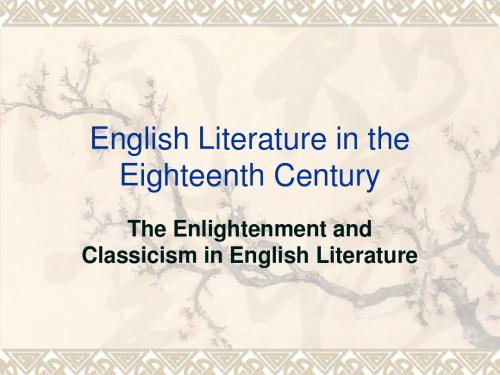
The neoclassicists have their artistic ideas: order, logic, symmetry, restraint, good taste, good sense, decorum and so on. In drama, they follow the three unities closely.
Prose should be precise, direct and flexible.
The 18th century is an age of Reason, an age of elegance and an age of classicism.
The
enlighteners celebrated reason or rationality, equality & science. They called for a reference to order, reason & rules & advocated universal education. Famous among the great enlighteners in England were those great writers like John Dryden, Alexander Pope & so on.
The English Enlighteners
The English enlighteners of the 18th century strove to bring it to an end by clearing away the feudal ideas with the bourgeois ideology.
英国文学 18th-Century Fiction
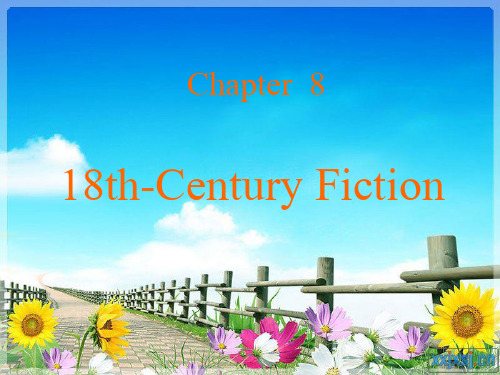
His major works
The Battle of the Books Tale of a Tub The Irish Drapier’s Letters A Modest Proposal Gulliver’s Travels
Gulliver’s Travels
The book consists of four books, each of which deals with one of the four voyages of Lemuel Gulliver, the protagonist, to the four remote and fantastic countries– Lilliput, Brobdingnag, Laputa, and Houyhnhnms--after he has met with shipwrecks, or pirates or other unfortunate happenings on the sea. Through the description of Gulliver’s adventures, Swift strips off the veil that covers the hypocrisy, injustice, crude vices of his society, to expose them all to the satire.
In the field of literature he became a dictator from whom even Alexander Pope had to take his cue at times as times as to what to write and who to attack. Swift has been seen by some people as the literary king of his day. Swift is probably the foremost prose satirist in the english language, and is less well known for his poetry.
TEM8 英语专八英美文学
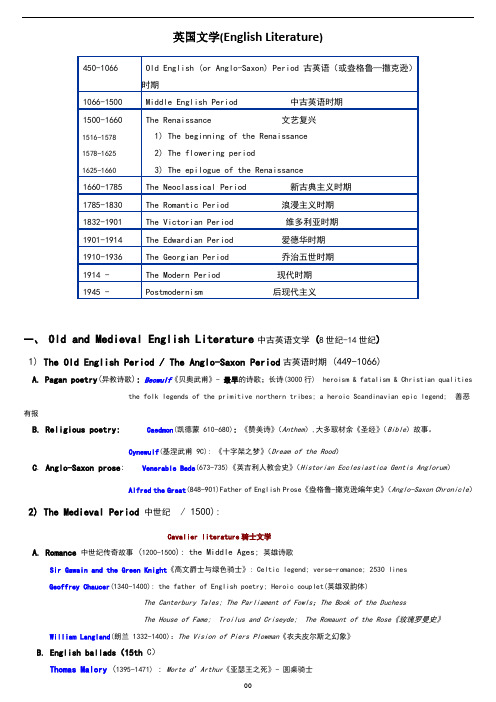
英国文学(English Literature)一、Old and Medieval English Literature中古英语文学(8世纪-14世纪)1) The Old English Period / The Anglo-Saxon Period古英语时期 (449-1066)A. Pagan poetry(异教诗歌): Beowulf《贝奥武甫》- 最早的诗歌;长诗(3000行) heroism & fatalism & Christian qualitiesthe folk legends of the primitive northern tribes; a heroic Scandinavian epic legend; 善恶有报B. Religious poetry:Caedmon(凯德蒙 610-680): 《赞美诗》(Anthem),大多取材余《圣经》(Bible)故事。
Cynewulf(基涅武甫 9C): 《十字架之梦》(Dream of the Rood)C. Anglo-Saxon prose: Venerable Bede(673-735)《英吉利人教会史》(Historian Ecclesiastica Gentis Anglorum)Alfred the Great(848-901)Father of English Prose《盎格鲁-撒克逊编年史》(Anglo-Saxon Chronicle)2) The Medieval Period中世纪 / 1500):Cavalier literature骑士文学A.Romance中世纪传奇故事 (1200-1500): the Middle Ages; 英雄诗歌Sir Gawain and the Green Knight《高文爵士与绿色骑士》: Celtic legend; verse-romance; 2530 linesGeoffrey Chaucer(1340-1400): the father of English poetry; Heroic couplet(英雄双韵体)The Canterbury Tales; The Parliament of Fowls;The Book of the DuchessThe House of Fame; Troilus and Criseyde; The Romaunt of the Rose《玫瑰罗曼史》William Langland(朗兰 1332-1400):The Vision of Piers Plowman《农夫皮尔斯之幻象》B.English ballads(15th C)Thomas Malory(1395-1471) :Morte d’Arthur《亚瑟王之死》- 圆桌骑士二、The Renaissance Period英国文艺复兴 (1500-1660):人文主义humanism; 十四行诗Sonnets; 无韵诗Blank verse; 戏剧Drama; 斯宾塞诗体Spenserian;University Wits 大学才子派1) 诗歌a. Thomas Wyatt(怀亚特1503-1542): the first to introduce the sonnet into English literatureb. Sir Philip Sidney(雪尼爵士 1554-1586):代表了当时的理想 - “the complete man”Defense of Poetry《为诗辩护》Astrophel and Stella《爱星者与星》;Arcadia《阿卡狄亚》: a prose romance filled with lyrics; a forerunner of the modern worldc. Edmund Spenser(斯宾塞1552-1599): the poets’ poetThe Shepherd Calendar《牧人日历》;Amoretti《爱情小唱》The Faerie Queen《仙后》:long poem for Queen Elizabeth; Allegory - nine-line verse stanza/ the Spenserian StanzaSpenserian Stanza(斯宾塞诗体): Nine lines, the first eight lines is in iambic(抑扬格) pentameter(五步诗),and the ninth line is an iambic hexameter(六步诗) line.2) 散文a. Thomas More(莫尔 1478-1535): 欧洲早期空想社会主义创始人Utopia《乌托邦》: More与海员的对话b. John Lyly (黎里 1553-160,散文家,剧作家&小说家):Eupheus《尤菲绮斯》Euphuism(夸饰文体): Abundant use of balanced sentences, alliterations(头韵) and other artificial prosodic(韵律) means.The use of odd similes(明喻) and comparisonsc. Francis Bacon (培根 1561-1626):Essays(论说文集):Of Studies, Of Love, Of Beauty: the first true English prose classicPhilosophical: New Instrument《新工具》New Atlantis《新大溪岛》Advancement of Learning《学术的推进》Professionals: Maxims of the Law《法律格言》3) 戏剧a. Christopher Marlowe: University Wits 大学才子派First made blank verse(无韵诗:不押韵的五步诗) the principle instrument of English dramaThe Jew of Malta《马耳他的犹太人》The Tragical History of Doctor Faustus《浮士德博士的悲剧》:根据德国民间故事书写成; 完善了无韵体诗。
【分析】18世纪英国文学特点分析
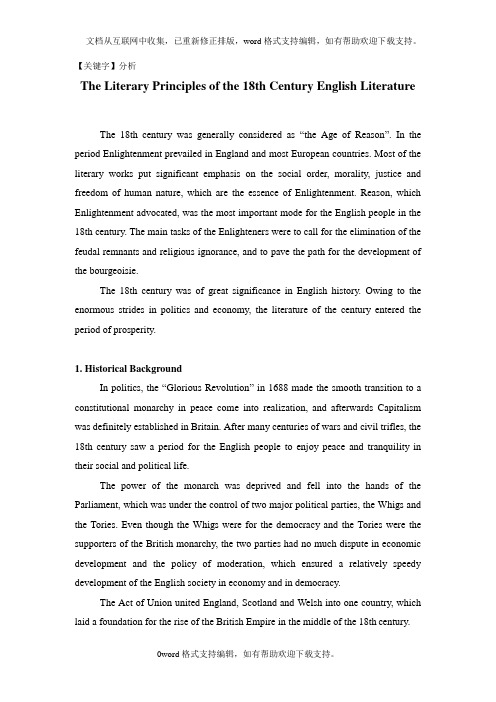
【关键字】分析The Literary Principles of the 18th Century English LiteratureThe 18th century was generally considered as “the Age of Reason”. In the period Enlightenment prevailed in England and most European countries. Most of the literary works put significant emphasis on the social order, morality, justice and freedom of human nature, which are the essence of Enlightenment. Reason, which Enlightenment advocated, was the most important mode for the English people in the 18th century. The main tasks of the Enlighteners were to call for the elimination of the feudal remnants and religious ignorance, and to pave the path for the development of the bourgeoisie.The 18th century was of great significance in English history. Owing to the enormous strides in politics and economy, the literature of the century entered the period of prosperity.1. Historical BackgroundIn politics, the “Glorious Revolution” in 1688 made the smooth transition to a constitutional monarchy in peace come into realization, and afterwards Capitalism was definitely established in Britain. After many centuries of wars and civil trifles, the 18th century saw a period for the English people to enjoy peace and tranquility in their social and political life.The power of the monarch was deprived and fell into the hands of the Parliament, which was under the control of two major political parties, the Whigs and the Tories. Even though the Whigs were for the democracy and the Tories were the supporters of the British monarchy, the two parties had no much dispute in economic development and the policy of moderation, which ensured a relatively speedy development of the English society in economy and in democracy.The Act of Union united England, Scotland and Welsh into one country, which laid a foundation for the rise of the British Empire in the middle of the 18th century.In economy, the international trading and the lucrative slave trade brought tremendous wealth. Although almost all the European countries had been on the process of industrialization, in England the development was accelerated with the help of the new inventions and a large-scale Enclosure Movement all over the country. The social status of the newly rising bourgeoisie was gradually set up by the boom of economy at home and abroad.However, the time the capitalists accumulated the enormous profits was the time thousands of peasants were expropriated off the land and the labor workers lost their jobs. The gap between the ruling class and the oppressed was aggravated. The social contradictions were accumulated and deteriorated.In social life, economic development also brought changes for the English people’s way of life. The people began to have more energy to participate in the social life. Such places for the social activities as the coffeehouse, the theaters and libraries gradually thrived. In the coffeehouse, information, opinions and even gossips on various issues were exchanged and the style of literature was formed and influenced in the public way.The economic prosperity and the rising of the bourgeois class produced a new requirement for a new social order and rules to meet the need of the social development in politics and morality, and the need of a way to clear away the feudal remnants. The literary men achieved the aim by means of the introduction of the reason, morality, and equality. The development of science and technology boosted the process. Isaac Newton exerted great influence upon Enlightenment with his law of gravitation, which smashed the medieval superstition to the natural forces.2. The Principles of LiteraryIt was impossible to make a clear distinction of the different literary genres with so many factors mixed together. Roughly, the literature in the 18th century was divided into three periods, from the late of the 17th century to the middle of the 18th century the popularity of the Neoclassicism, the early to the middle 18th century the rapid growth of the realistic novels of Defoe, and the outstanding novelists Fieldingand Smollett, and the last decades of the prevalence of Sentimentalism and the appearance of Romanticism.The literary trend of this century could be summarized as the development of poetry, the prosperity of prose, the rise of novel and the decline of drama.2.1 Enlightenment in LiteraryThe 18th century is known as “the Age of Enlightenment”, which is a progressive intellectual movement as a furtherance of the Renaissance of the 15th and 16th centuries. The Enlightenment left a lasting heritage for the 19th and 20th centuries.Enlightenment was not only a culture and thought movement, but has exerted huge influence on almost all of the aspects of the English people’s social life. The Enlighteners took the task to enlighten the people with the modern ideas in philosophy, politics and arts. The Enlighteners believed that the universe was rational and could be understood through Reason. Truth could be got through the empirical observation. And reason was the only yardstick to measure all human activities and relations. Only in this way can the primitive thoughts and feudal behaviors, such as superstition, injustice, oppression and religious persecution, be eliminated. The Enlighteners also fought against the social hierarchy system and called on the development of science and technology.Besides, they praised highly for the function of education. They held the belief that the universal education could bring about rationality, equality and truth. They believed that the human beings could be manipulated like the engine once they acquired these characteristics.In essence, the Enlightenment Movement was the struggle of the progressive bourgeoisie against Feudalism. For the bourgeois intellectuals, the Reason was the weapon to overthrow the domination of Feudalism. They sought the freedom of politics and academic thinking to pave the way for the establishment of the Capitalism.In brief, the Enlightenment movement was to enlighten or educate the peoplewith the modern philosophical and artistic ideas. Literature at the time showed the strong characteristics of didacticism and moralization. Among the famous Enlighteners in England, John Dryden and Alexander Pope were the most conspicuous.2.2 NeoclassicismThe influence of the Enlightenment Movement to the English literature of the 18th century was first reflected in the emergence and popularity of the Neoclassicism. Neoclassicism was a literature genre that came into being in the middle and late of the 17th century in England and France, and thrived in the beginning of the 18th century. John Dryden,though dead in 1700, was the first advocator and the most important performer.After the Renaissance, a reaction came against intricacy, boldness and extravagance. In the period, the literature brought about a revival of interest in the old Classical works. The writers got the ideas and art forms from the classical times. As John Dryden stated in his Essay of Dramatic Poesy, the Neoclassicists demanded that literature should learn from the Classical works of the ancient Greek and Roman writers and also their contemporary French writers, such as V oltaire and Diderot. The Neoclassicists advocated simplicity, restraint, regularity and good sense. They believed that accuracy and wits should be the most important elements in the art creation.The Neoclassicists formulated fixed rules and laws guided by Greek and Latin works for the genres of literature to follow. They believed that there was the proper language to choose and the right style and tone to use when they wrote different literature, which was the “correctness” that they pursued. Therefore, such standards of the Classics as drama, rhyme and good proportion were advocated. Under the guideline, poetry should be lyric, epic, didactic, or dramatic, and prose should be precise, direct, smooth and flexible.Meanwhile, the Neoclassicists argued that literature should be judged by the function of moralization and education. Therefore, most of the literature during thatperiod was didactic so as to form a new social order and morality to meet the needs of the new era.What’s more, another aim of the literature was to entertain the readers. With the boom of the publishing industry and the increase of the educated population, new ways to entertain the mass, especially the people of the middle class, were called on. The expectation of the people to participate in social activities and express their emotions grew stronger. Hence, the simple, elegant and restraint writing styles gained popularity.Furthermore, the writings of Neoclassicism shared a common feature—objectivity. As the neoclassicists emphasized Reason and thought that art should be logically organized, neoclassical art did not appreciate the emotion or imagination, but logic, good organization and proportion. However, literature under this guideline seemed a bit cold and inhumane. The absence of any elements of romantic and the over emphasis on Reason led to the rise of the opposite genr e—Romanticism in the period followed.However, literature at that period was not simply the imitation of the Classics but something new was injected into it. Dryden, the advocator of the Movement, laid emphasis not only on Neoclassicism, but also on the traditional English literature. He praised the works of Shakespeare’s and Chaucer’s, and encouraged the combination of the classics with the native elements of England to make the writing style new. Dryden’s theory was modern and flexible, so it was easy to be accepted and promoted by his followers in the 18th century, such as Alexander Pope and Swift. The idea promoted the popularity of the English literature, especially the first half of the 18th century.With the influence of Neoclassicism, the prose was developed dramatically. A lot of prose writers and novelists appeared, like Addison, Daniel Defoe, Henry Fielding and Samuel Richardson.Even though the Neoclassicism did not flourish very long in the history of English literature and was substituted by the Sentimentalism and Romanticism. The ideas of reason, wit, simplicity and regularity existed and influenced the Englishliterature even to the modern times.2.3 The Origin of the English NovelThe 18th century was the golden age of the novel. The origin of the novel can date back to Homer’s epic, the legend in the medieval times of Europe and the adventure stories in Europe. However, in English literature, the novel, the new genre, emerged and the realistic novels reached the peak in the 18th century. Many great novelists, such as Defoe, Swift, Richardson, Fielding and Smollett, were not only world famous, but has left a great cultural heritage.In the 18th century, the rapid growth of economy boomed the city life. The middle class had more leisure time to entertain themselves. They called for fresh ways of entertainment and expressions of their thoughts and emotions. In the new social system, the patronage, which used to be the main means for the writers to get subsidization, was substituted by the new system of publishing and copyright. The writers had more freedom to write what they wanted to and some of them wrote to cater to the popular taste. At the same time, a new and great need for the reading emerged. Libraries stepped into the people’s daily life, so that more and more prints were called for in the huge market. They were all the reasons to promote the originality and development of English novels, especially the rise and the prosperity of the realistic novels in the 1730s to 40s.2.3.1 The Realistic NovelIn the first half of the 18th century, “reality”became the most important conception of the creation of novels. Novels were not only the means for the writers to reflect their life and feelings but also the way for the common people to express their passion and emotions.In the process of elevating their social status and accumulating the wealth, the bourgeois fought with the old system and had endured the hardships. The whole meaning of their life was to work hard, to make wealth and to get a better life. What was realistic in the true life was represented faithfully in the realistic novels of thecentury.The feature was best found in Robinson Crusoe, Denial Defoe’s masterpiece. Denial Defoe was named the “father of English realistic novel” by some scholars not only because Robinson Crusoe was the first realistic novel in the 18th century and the first modern English novel, but also it was a good example of the “truth to life”.In the novel, the writer gave the reader a vivid description of the spirit of struggle and adventure at the beginning of the Capitalism, and successfully portrayed an image of an enterprising Englishman. The realistic presentation of the growth and struggle of Robinson showed the spirit of that time. Robinson, as a businessman who pursued wealth, was a typical representative of the English middle-class men with courage, energy, persistence and wisdom. His struggle against the hostile natural environment showed the strong confidence of the bourgeoisie to fight for the ambitions. Robinson grew from a naive youth full of dreams into a realistic and hardened man, tempered by numerous trials in his eventful life.Besides, Robinson was also the representative of the bourgeois colonizers who took control of the new land and his servant, Friday. Therefore, this novel was the product of the Industrial Revolution and a real presentation of life of the common people.Generally, the writers of the realistic novels would claim that what they had written was really based on the true events with the real place names and the exact date as the background. At the beginning of Robinson Crusoe, “he” said, “I was born in the Year 1632, in the City of York, of a good Family, though not of that country, my father being a foreigner of Bremen who settled first at Hull.” And later the description of his life in Brazil as a planter conformed to the historical facts at that time. In the novel, the colloquial, easy language and sometimes, short, plain sentences were used to leave the readers the impression that the hero was true to life and was telling his stories face to face. In the narrative, the writers put an emphasis on the detailed account of the process and the description of the mental activity. In Robinson Crusoe, the vivid description of the details made the story fascinating. However, this novel was criticized for the repetition and the loose structure.Besides, even though the themes of the realistic novels were different, they had the same core, which was the searching for the essence of life. Through the account of the living conditions and the way of living at that period, the writers sought the answers from the common people, and even the vulgar and the poor, which was contrary to the traditional romance of aristocrats or epics. Through Robinson, who lived alone in an isolated island, and Tom Jones, an outcast in Henry Fielding’s masterpiece The life and History of the Foundling Tom Jones, the writers, against the mode of the Neoclassicism, expounded that the courage, the wisdom, the persistence and the morality of the mass people were the primitive power for the social progress.To summarize, the realistic novels, for the first time turning their attention from the grand themes and the high classes to the common people and the reality, adding the modern element to the writing style of that period. That is why Robinson Crusoe was taken as the forerunner of the modern novel.Besides Daniel Defoe, Henry Fielding and Tobias Smollett made even higher achievement. Their works had impact on some of the great works of European writers, and paved the way for the great 19th century realistic writers like Jane Austen, Walter Scott, Charles Dickens and William M. Thackeray.2.3.2 The Epistolary NovelIn the 18th century, another style emerged and brought in a new way of narrative, which is the epistolary novel. Samuel Richardson flourished the style by three famous works Pamela, Clarissa and Grandson.The novel Pamela was written in the form of a series of letters from the heroine to her parents. In the letters she told them her life and experience at her master’s house. The epistolary novels not only enriched the narrative form of the novel, but also transformed the role of the writers from the narrator to the editor. By means of the pile of letters, the heroine herself told the story. In the epistolary novel, the characters would get closer to the reader. The mental activities and the change of their emotions could be more vivid. It was easy to get the readers to resonate deeply with the fate of the heroine. Pamela was among the first novels to give detailed descriptionof the character’s psychology. It described not only the common life of the characters, but through the letters their inner thoughts and feelings. Therefore, this novel was also considered as the first psycho-analytic novel in the history of English literature. The vivid description of the psychology of the females gave an impetus to the development of the modern novels. From this perspective, Richardson was thought of the real founder of English modern novels by some scholars.The subtitle of the novel was Virtue Rewarded, the function of moral instruction and education was clearly showed in the novel beside that of entertainment.2.3.3 The Gothic NovelIn the last decades of the 18th century, the English realistic novel gradually gave way to the Gothic novel or the Gothic romance.The Gothic novel refers to the strange, mysterious adventures happening in dark and lonely places such as graveyards and old castles built in the middle ages, such as the Gothic castle. The Gothic novel originated from Horace Walpole’s novel The Castle of Otranto in 1764. As a branch of the English literature, the Gothic novels played an important role in the development of the horror movies and left great influence upon the English romanticists.Generally speaking, the Gothic novels included such elements as horror, mystery, supernature, and death. Usually the story would be set in the classic castles with haunted ghosts. The typical story focused on the sufferings or mystery imposed on an innocent heroine. Frequent use was made of ghosts, mysterious disappearances, sensational and supernatural occurrences. The principal aim of such novels was to evoke chilling terror by exploiting mystery and a variety of horrors.2.4 The Satire StyleSatire,another typical feature of this period’s writing, prevailed in the first half of the 18th century. A common feature of satire was to use strong irony or sarcasm, usually in parody, exaggeration and comparison, to attack something they did not accept or approve of. Not only was satire an effective weapon for arguments of allkinds and attacks on the political views, the social system and social life, but also it answered well the purpose of the Enlightenment, aiming at universal education to perfect the mass in moral, social as well as cultural life.In the 18th century, satire prevailed at a certain historical background. Even though this was a relatively peaceful period in English history, various divergences of values and conflicts still existed. With the increase of the wealth, the bourgeoisie expected to have higher social status and more power to control the nation, which was to turn over the social hierarchy and social custom. The contradictions between the two parties increased the social unrest. Among them the contradictions between the ruling class and the laboring poor were gradually intensified. The industrial Revolution and foreign trade brought a large quantity of wealth to the country, but that did not spread to the mass of the poor people. Correspondingly, social problems and discontent were constantly emerging. The social reality was reflected in the literary works in a satirical style.Pope and Swift were the superb satirists during that period. Swift defined a good style as “proper words in proper places”. Their satires are well-known for witty remarks and adept techniques. So satire became the fashion and was performed almost in all forms of writing at the time.Jonathan Swift not only was one of the greatest representatives of the genre, but also was thought of the first writer to perform the modern satire. Even though he advocated Reason, he sometimes held certain skepticism to the “universal Reason”. He was well-known for his meaningful wording and the diversified writing techniques in his satiric novels.In A Modest Proposal, the writer suggested a seemingly logical proposal for the Irish slum, only to mock the heartlessness and selfishness of the high classes as well as their inhumane Irish policy in general. This essay has been regarded as the most ridiculous and savage ironical satire.In Gulliver’s Travels, the writer used fancy to make up an imaginary social condition, by using imaginary plots and exaggerated techniques to satirize and attack the social system and the politics. The book seemed to be an allegorical story forchildren, but in it the vanity and hypocrisy of the contemporary courts, statesmen and political parties were satirically attacked. In the first two parts of the novel, the writer mocked the conflicts between the parities, the Whigs and the Tories. In the part of the Flying Island, the writer described the strange and useless experiments that the scientists did, through which Swift satirized that the science was far away from the practical life.Henry Fielding’s works showed a grand panorama of life of the 18th century English society through the realistic description of the details. In his works, the characters were true-to-life, and full of optimism. Yet he also mildly criticized the weakness of the human nature and the vulgar social customs. His works Joseph Andrews was at first written to ridicule Richardson’s Pamela for its utilitarian morality, but made a big success unexpectedly. He claimed that this novel was “a comic epic poem in prose”in the preface of Joseph Andrews. However, different from the traditional epic, which is a genre generally used to praise heroes, nobles or kings, Fielding took advantage of the conception but portrayed the heroes of the middle or low classes so as to produce the ironic effect.Fielding’s Jonathan Wild the Great is a bitter satire on the exploiting and oppressing class. It is one of the best exposures of the corruption of the English bourgeois-aristocratic society. The “great”in the title referred not only to the hero “Jonathan Wild”, but also the minster “Robert Walpole” and other “great” men in the ruling class. From these men, Fielding summarized a common virtue “greatness” from their true nature of tyranny, corruption, oppression and exploitation to others.The Life and the History of Tom Jones, a Foundling, as Fielding’s masterpiece, was another good example. The story, through the growth of a foundling, Tom Jones, touched upon all kinds of people as well as the social problems. The novel was about a young man and a young woman who tried to unravel their birth myth, and their love story. In the process of their looking for their birth, Fielding gave the readers an extensive view of the social life in the city and the town. Through the comparison of different characters they met, the writer severely criticized the corruption, greed and hypocrisy of the nobles at that period. Fielding contributed a lot to the advance of theEnglish and European novels.2.5 SentimentalismSentimentalism was a trend of thought beginning in the 1740s and 50s. Its name was gained from Laurence Stern’s A Sentimental Journey through France and Italy (1768). By the middle of the 18th century, sentimentalism came into being due to the discontent with the social reality.In the middle of the century, the contradictions were intensified to the degree that the nation was faced with the threat of instability. The Enlighteners, such as, Fielding and Smollett, who at first had sufficient faith in the eventual triumph of virtue and the final achievement of social justice, began to be skeptical about the eternal “truth” and Reason, which were preached by the bourgeoisie.Even though the people began to doubt the power of the Reason to solve the social problems, they could not find out a more positive way to make the society better. The decline of the great Enlightenment brought about sentimentalism and pre-romanticism as the protest against the social reality of the day. Sentimentalism was an outlet for their dissatisfaction to the reality and for the escape from the far-from-perfect reality. Sentimentalism was the forerunner of the Romanticism later prevailing in the European literature.Form the angle of the ideology, sentimentalism was against the classicism and the rationalism. It was totally opposite to the perspective of the rationalism that the individuals should be under the control of the sovereignty. Sentimentalism stressed the expression of the emotions and feelings of the individual in the daily life. It concentrated on the distress of the poor and the virtuous people. It revealed grief, pains and tears. The emotions were mainly melancholy, sentimental and sensitive.Leslie Stephen once argued, “Sentimentalism could be defined to be indulgence in emotion for its own sake. The sentimentalist does not weep because painful thoughts are forced upon him but because he finds weeping pleasant in itself (p160).”In sentimental works, the first characteristics is that the characters’ mood and miserable life were portrayed to arouse readers’ sympathy to the ordinary people and discontent towards the social reality. The appeal to sentiment, not Reason, was themain characteristics. Sentimentalists thought that Reason was only a cold rule or law to tell the people the code of conduct. In their views, human beings were born good and were endowed with compassion, kindness and morality. Hence, the function of literature was to awaken and motivate the potential.The writers usually made use of death, loneliness and miserable experience to make the atmosphere desolate, dark and melancholy. In this way, the readers were easy to move and full of sympathy to the character. At the beginning of the century, almost all the works, as poetry, novels and essays were rational, ironic and instructive. Sentimentalism totally changed the direction of English literature. At the same time, the educational function was also fulfilled.Besides, the common people molded in the works made the readers feel real empathy for what the characters had been through. And the sympathy for the misery of others became a sign of good manners and social morality.What’s more, in the views of the sentimentalists, there was no distinction of the genres of literature, that is, elegance or vulgarity. Therefore, a lot of different literature styles, such as prose, lyric, letter, autobiography, became the common styles in sentimentalism.Sentimentalism, having obtained pleasure in nature and the mysterious, paved the way for Romanticism, which put high value on nature and spontaneous expression of emotion. In addition, romanticists’ praise for the virtue of the common people and the attack on the rich and the system owed a good deal to sentimentalism.The most outstanding figure of English sentimentalists are Laurence Sterne who wrote A Sentimental Journey through France and Italy in 1768 and Thomas Gray with his masterpiece, Elegy Written in a Country Churchyard, the model of sentimental poetry.Sentimentalism in poetry first found its full expression in the 40s and the 50s and was the bridge from Classicism to Romanticism. In Thomas Gray’s Elegy Written in a Country Churchyard, the poem reflected the poet’s melancholy on the death and the sorrowful life of human beings. The poet also pointed out that death was inevitable no matter who you were. This poem, with the well-balanced structure and。
English literature V-18世纪英国文学
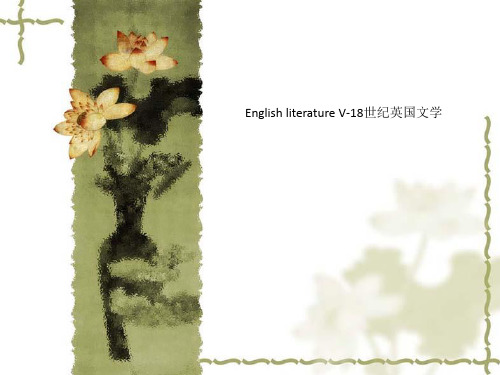
British Empire
Mongol Empire
Eurasia on the eve of the Mongol invasions, c. 1200.
Historical Background
❖ The "Glorious Revolution" of 1688 ended in a compromise between the aristocracy and bourgeoisie. England became a constitutional monarchy and power passed from the King to the Parliament and the cabinet ministers.
sustained growth.
Industrial Revolution
❖ The application of steam power to the industrial processes of printing supported a massive expansion of newspaper and popular book publishing, which reinforced rising literacy and demands for mass political participation.
❖ During the Industrial Revolution an intellectual and artistic hostility towards the new industrialization developed. This was known as the Romantic movement.
❖ The movement stressed the importance of "nature" in art and language, in contrast to "monstrous" machines and factories.
18世纪英国文学(一)

Chapter 2 Alexander Pope(蒲伯)
• Alexander Pope (1688-1744) was the most important English poet in the first half of the 18th century.
Life
• The boy was precluded from formal education by his Roman Catholicism, Pope was mainly self-educated. • A deformity of the spine and other health problems limited his growth and physical activities, leading him to devote himself to reading and writing. • At 12, he was able to compose dramatic poems; at 16, he wrote his ―Pastorals―(田园诗); and when he was only 22, his poem ‖Essay on Criticism‖(批评论) was published, and from then on he was looked up to as a great master of verse in England and in Europe.
2. Classicism
• An attitude to literature or a movement that is guided by admiration of the qualities of formal balance, proportion, decorum端庄 得体, and restraint适度 attributed to the major works of ancient Greek and Roman literature (‗the classics‘)
18世纪的英国文学

❖Gulliver’s Travels records the pretended four voyages of Gulliver, and his adventures in four strange countries.
❖A Modest Proposal is a more bitter satire on the policy of the English government towards the Irish people.
the guiding principle or slogan is Ration/Reason, natural right and equality
Ration became standard for measurement of everything.
The Enlightenment Movement
❖ 2.The rise of English novel: an important phenomenon of the period.
❖ 3. Gothic novels emerged and flourished in the last decade of the 17th century, which combine both elements of horror and romance.
18世纪英国文学发展
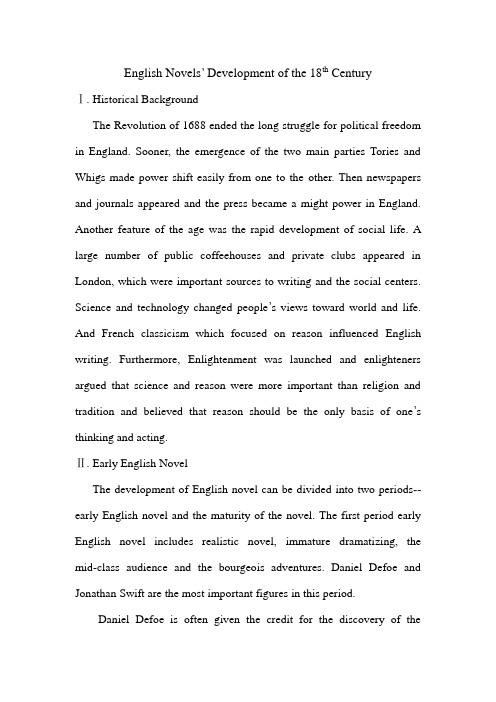
English Novels’ Development of the 18th CenturyⅠ.Historical BackgroundThe Revolution of 1688 ended the long struggle for political freedom in England. Sooner, the emergence of the two main parties Tories and Whigs made power shift easily from one to the other. Then newspapers and journals appeared and the press became a might power in England. Another feature of the age was the rapid development of social life. A large number of public coffeehouses and private clubs appeared in London, which were important sources to writing and the social centers. Science and technology changed people’s views toward world and life. And French classicism which focused on reason influenced English writing. Furthermore, Enlightenment was launched and enlighteners argued that science and reason were more important than religion and tradition and believed that reason should be the only basis of one’s thinking and acting.Ⅱ.Early English NovelThe development of English novel can be divided into two periods-- early English novel and the maturity of the novel. The first period early English novel includes realistic novel, immature dramatizing, the mid-class audience and the bourgeois adventures. Daniel Defoe and Jonathan Swift are the most important figures in this period.Daniel Defoe is often given the credit for the discovery of themodern novel. His book Robinson Crusoe, showing an exciting tale with simple and brief words, is one of the forerunners of the English 18th century realistic novel.In Jonathan Swift’s world famous novel Gulliver’s Travels, he typified the bourgeois world, drew ruthless pictures of the depraved aristocracy and satirically, portrayed the whole of the English state system. This novel is regarded as one of the greatest satires in England. Ⅲ.The Maturity of the NovelThe second period is the maturity of the novel which includes sentimental novel, realistic novel and pre-romantic novel.Samuel Richardson and Laurence Sterne are outstanding figures of English Sentimentalism. Samuel Richardson’s Pamela, or Virtue Rewarded and Clarissa, or the History of a Young Lady are epistolary novels, which enriched European literature with the method of Psychological analysis. Laurence Sterne’s Tristram Shandy and Sentimental Journey reveal a purely emotional approach to life on the part of the narrator.Realistic novels show things and people as they are in real life. Henry Fielding and Tobias Smollet are the founders of the genre of the bourgeois realistic novel in England. In Henry Fielding’s novel The History of Tom Jones, a Foundling, he invariably put such characters in position which tear away their masks. Tobias Smollet touched uponvarious aspects of English life in his satirical novels.Pre-romantic novel described romantic adventures in mysterious or frightening surroundings, which can also be called Gothic novel. It is the origin of horrible novel.ⅠV. ConclusionAlthough England’s chief achievement is in the fields of drama and poetry, England’s novel strongly influenced the development of English literature, especially in the 18th century. In this period, many outstanding figures emerged with a large number of excellent and famous books which are very familiar to all of us. For example, Robinson Crusoe showed an image of an enterprising Englishmen, which left a deep impression. These novelists and their famous works have contributed much to the literature of England and Europe and even the whole world.。
英国文学简史-18th-century(1)PPT课件
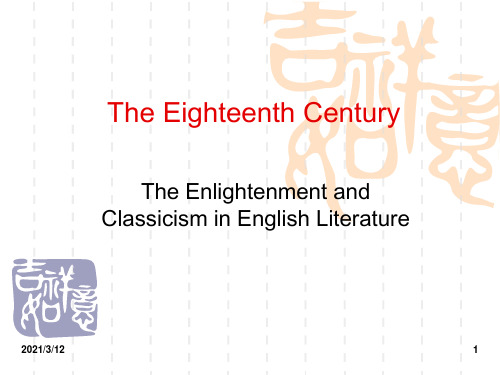
man as an imperfect being, inherently sinful, whose potential was limited.
emphasis on order and reason, on restraint, on common sense
Enlightenment Movement
The England Enlightener (P127)
2021//12
2
The 18th Century England
comparatively peaceful development
In politics
a constitutional monarchy
2021/3/12
11
Dissimilarities in Point of View
man as a being fundamentally good and possessed of an infinite potential for spiritual and intellectual growth.
2021/3/12
5
The Features of English Enlightenment
▪ (1)English enlighteners believed in the power of reason. That is why the 18th century has often been called “the age of reason” or “the kingdom of reason”.
3
英国文学知识简单整理
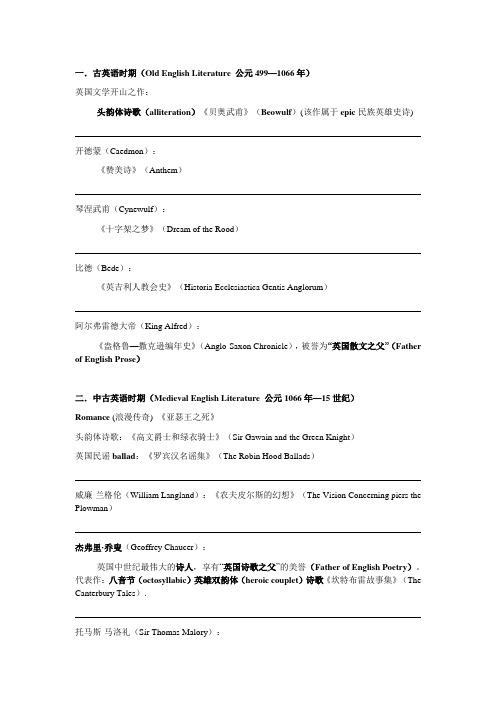
一.古英语时期(Old English Literature 公元499—1066年)英国文学开山之作:头韵体诗歌(alliteration)《贝奥武甫》(Beowulf)(该作属于epic民族英雄史诗)开德蒙(Caedmon):《赞美诗》(Anthem)琴涅武甫(Cynewulf):《十字架之梦》(Dream of the Rood)比德(Bede):《英吉利人教会史》(Historia Ecclesiastica Gentis Anglorum)阿尔弗雷德大帝(King Alfred):《盎格鲁—撒克逊编年史》(Anglo-Saxon Chronicle),被誉为“英国散文之父”(Father of English Prose)二.中古英语时期(Medieval English Literature 公元1066年—15世纪)Romance (浪漫传奇) 《亚瑟王之死》头韵体诗歌:《高文爵士和绿衣骑士》(Sir Gawain and the Green Knight)英国民谣ballad:《罗宾汉名谣集》(The Robin Hood Ballads)威廉·兰格伦(William Langland):《农夫皮尔斯的幻想》(The Vision Concerning piers the Plowman)杰弗里·乔叟(Geoffrey Chaucer):英国中世纪最伟大的诗人,享有“英国诗歌之父”的美誉(Father of English Poetry)。
代表作:八音节(octosyllabic)英雄双韵体(heroic couplet)诗歌《坎特布雷故事集》(The Canterbury Tales).托马斯·马洛礼(Sir Thomas Malory):英国15世纪优秀的散文家,代表作为《亚瑟王之死》(Le Morte d’Arthur)三.文艺复兴时期(Renaissance 15世纪末—17世纪)托马斯·莫尔(Thomas More):伟大的人文主义者,代表作:《乌托邦》(Utopia),《国王爱德华五世悲戚的一生》(The painful Life of Edward Ⅴ).托马斯·魏厄特(Thomas Wyatt)和亨利·霍华德(Henry Howard)的十四行诗(Sonnet).前者将意大利十四行诗引入英国;后者在此基础上,发展了英国十四行诗歌。
十八世纪英国文学概述

Abroad: No. 1 naval power, vast expansion of colonies At Home: Acts of Enclosure Industrial Revolution IR was a period from the 18th to the 19th century where major changes in agriculture, manufacturing, mining, transport, and technology had a profound effect on the socioeconomic and cultural conditions starting in the United Kingdom, then subsequently spreading throughout Europe, North America, and eventually the world.
Literature of the Period
The Realistic Novel In order to cast away the aristocratic romance of feudal lords and their way of life, a new and realistic literature of the middle-class people is created to express their idea and serve their interests. Defoe, Fielding were among the major novelists of the time.
Cultural Background
Enlightenment Movement The Age of Enlightenment (or simply the Enlightenment) is the era in Western philosophy, intellectual, scientific and cultural life, centered upon the 18th century, in which reason was advocated as the primary source for legitimacy and authority. In the later part of the century, people began to feel discontented with the rigidity of rationality.
week7The Eighteenth Century English Literature--18世纪英国文学
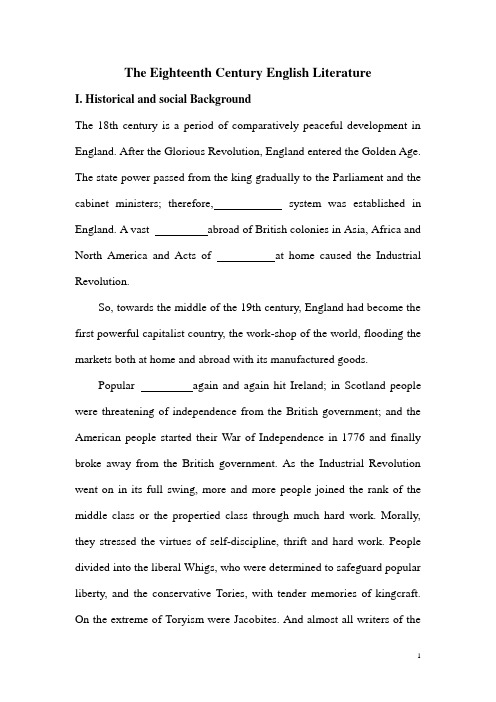
The Eighteenth Century English LiteratureI. Historical and social BackgroundThe 18th century is a period of comparatively peaceful development in England. After the Glorious Revolution, England entered the Golden Age. The state power passed from the king gradually to the Parliament and the cabinet ministers; therefore, system was established in England. A vast abroad of British colonies in Asia, Africa and North America and Acts of at home caused the Industrial Revolution.So, towards the middle of the 19th century, England had become the first powerful capitalist country, the work-shop of the world, flooding the markets both at home and abroad with its manufactured goods.Popular again and again hit Ireland; in Scotland people were threatening of independence from the British government; and the American people started their War of Independence in 1776 and finally broke away from the British government. As the Industrial Revolution went on in its full swing, more and more people joined the rank of the middle class or the propertied class through much hard work. Morally, they stressed the virtues of self-discipline, thrift and hard work. People divided into the liberal Whigs, who were determined to safeguard popular liberty, and the conservative Tories, with tender memories of kingcraft. On the extreme of Toryism were Jacobites. And almost all writers of theage were servants of Whigs or Tories during their competition.Ⅱ. Cultural Background1. EnlightenmentThe was a progressive intellectual movement throughout Western Europe in the 18th century. It was an expression of struggle of the bourgeoisie against feudalism. The enlighteners fought against class inequality, stagnation, prejudices and other survivals of feudalism. They thought the chief means for bettering the society was "enlightenment" or "education" for the people. The English enlighteners were bourgeois democratic thinkers. They set no revolutionary aim before them and what they strove for was to bring it to an end by clearing away the feudal ideas with the bourgeois ideology.Enlighteners fell into two groups-the group and the radical group. Moderate enlighteners supported the principles of the existing social order and considered that partial reforms would be sufficient. In this group may be included chiefly Alexander Pope, Joseph Addison and Richard Steele, Daniel Defoe and Samuel Richardson. They tried to work out a standard of moral conduct, which could be more suitable to the existing social conditions. Radical enlighteners struggled for more resolute democratization in the management of the government, and defended the interests of the exploited masses, the peasants and the working people in the cities. The representative writers of this group areJonathan Swift, Henry Fielding, Tobias George Smollett, Oliver Goldsmith and Richard Brinsley Sheridan. They stressed the discrepancy between what they called “the proper, moral standards”and the bourgeois-aristocratic society of their age.2. The influence of EnlightenmentInspired by the spirit of the Enlightenment, people were encouraged to cultivate a sound sense of rationality and a witty intellectuality. More schools were set up. The Copyright Act of 1709 made, for the first time in English history, literary creation an honorable and independent profession.Besides the popular forms of poetry, novel and drama, the period also saw the appearance of such popular press as pamphlets and newspapers and periodicals. And there was also the flourish of coffee houses and all kinds of social clubs, (about 2000 in London.) which greatly helped the cultivation and promotion of the new English culture.However, in the later part of the century, people began to feel discontented with the rigidity of rationality. A demand for a release of one's spontaneous feeling, a relaxation from the cold and rigid logic of rationality and an escape from, the inhuman Industrial Revolution gradually took shape in the form of sentimental and pre-romantic novel and poetry.Ⅲ. Characteristics of the LiteratureThe main literary stream of the 18th century was . What the writers described in their works were social realities. The main characters were usually common men. Most of the writers concentrated their attention on daily life. Literature included book, newspaper, magazine, and pamphlets. Prose had a rapid development in this age, so the 18th century was an age of prose.Novel writing made a big advance in this century. Along with the economic independence, the eighteenth-century writers enjoyed greater freedom in their creative activities and were now able to devote themselves to whatever interested them and to give utterance to whatever they thought right or proper. For the first time too, the literary tendency of the age was moving-away from the conventional romance stories about the life of the rich and noble people of the aristocratic class and turning to works that would give accounts of the common life of the ordinary folk.In this age was much used in writing. It refers to any writing, in poetry or prose, with the purpose to ridicule, censure(责难) and correct the vices, follies, stupidities and corruptions of the society, and to satirize their enemies.The development of the literature in this period can be summarized as: the predominance of neoclassical poetry and prose in the early decades of the 18th century; the rise and flourish of modern realistic novel in the middle years of the 18th century; and the appearance ofgothic novel and the sentimental and pre-romantic poetry and fiction in the last few decades of the 18th century.1. Neo-Classicism in English LiteratureIn early 18th century, writers of the neo-classical school were Addison, Steele and Pope. In the middle decades of the century, Samuel Johnson became the leader of the classical school in English poetry and prose.The classicists found their artistic models in the classical literature of the ancient Greek and Roman writers, and tried to control literary creation by some fixed laws and rules drawn from their works. In writing plays they used rimed instead of blank verse. They observed the three unities-the unities of time, place and action. They thought poetry should follow the ancient divisions, falling into lyric, epic, didactic, satiric or dramatic and each group should be guided by some peculiar principles. Prose should be precise, direct and flexible. They put the stress on the classical ideals of order, logic, restrained emotion, accuracy, good taste and decorum. Their works, mostly refined and perfect, are conscientious craftsmanship and often highly didactic. Neoclassical poetry reached its stylistic perfection during the period.A. Alexander Pope (1688-1744)a. A brief introduction of PopePope was the representative writer of the neo-classical school. He was a master in satire and heroic couplet and epigram. He popularized the neo-classical literary tradition. He was one of the early representatives of the Enlightenment, who introduced into English culture the spirit of rationalism and greater interest in the human world. He represented the highest glory and authority in matters of literary art and made great contributions to the theory and practice of prosody(诗学).b. Pope's Major Works:An Essay on Criticism《批评论》(1711), written in heroic couplet, was a manifesto of English neo-classicism. It sums up the art of poetry of old Greek and Roman.The Rape of the Lock《卷发遇劫记》(1714). A fop at the court forcibly cut off a lock of curls of a pretty maid of honor. In this poem the poet describes how a quarrel between two aristocratic families arose.It is a satire of the court life of that time.Essay on Man《人论》, written in her oic couplet, indicates the poet’s political and philosophical viewpoint. It deals with man’s relation to the universe, to society, to himself, and to happiness.The Dunciad《愚人志》is Pope’s famous satirical poem. It is full of bitter personal attacks on the poet’s personal enemies, and it also gives a broad satirical picture of the whole literary life in the early 18th century England.c. Pope’s epigram“Hills peep over hills, and Alps on Alps arise!”山外有山,天外有天。
English Literature-4 The 18th Century 英国文学英语版 教学课件
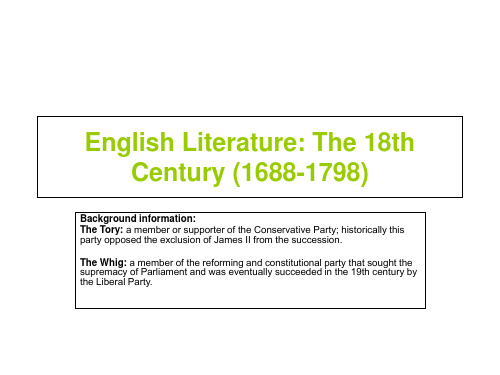
18th Century - 1
• England became a maritime superpower • Political writings • Newspapers and journals • Coffeehouses • The new morality • Science and technology:
Subjectivism Spontaneity Singularity Worship of nature Simplicity Melancholy Outpouring of emotions and feelings
English Literature of the 19th Century-3
• Traditionally in China, Romantic poets are divided into two groups:
The Passive (The Lake Poets): William Wordsworth (1770-1850) Samuel Taylor Coleridge (1772-1834) Robert Southey (1774-1843)
Fair youth, beneath the trees, thou canst not leave Thy song, nor ever can those trees be bare; Bold Lover, never, never canst thou kiss,
The Active / Progressive: George Gordon Byron (1788-1834) Percy Bysshe Shelley (1792-1822) John Keats (1795-1821
18世纪英国文学史
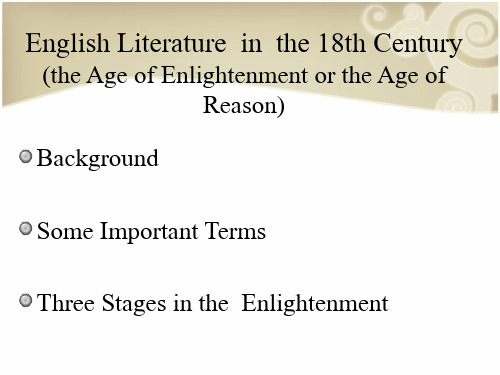
English Literature in the 18th Century (the Age of Enlightenment or the Age ofReason)BackgroundSome Important TermsThree Stages in the EnlightenmentPolitically➢Glorious Revolution in 1688 ended the monarchy, replacing it with a constitutional monarchy.➢The power passed from the king gradually to the parliament.➢the Tory and the Whig dominated the parliament by turnsSocially⏹the rapid growth of middle class⏹The Puritan spirit of wisdom, diligence, honesty, and thriftiness, self-discipline ⏹better education was available⏹more schools and social clubs were establishedEconomically◆Industrial Revolution, the 1st powerful industrial country◆continued to expand its coloniesIdeologicallyUnder the influence of scientific discoveries( Galileo,Newton) and flourishing of philosophies, French enlightenment started.Some Important Terms Enlightment:an intellectual movement beginning in France and then spread throughout Europe.•a continuation of Renaissance in belief in the possibility of human perfection through education•the guiding principle or slogan isRation/Reason, natural right and equality •Ration became standard for measurement of everything.Some Important Terms Neoclassicism: Appeared in last decades of the 17th to the early of the18th•Modelled Greek and Latin authors •Stress on order, logic, proportion, restrained emotion, accuracy, good taste major exponents of the neoclassical school: John Dryden and Alexander Pope.Sentimentalism:One of the important trends in English literature of the middle and later decades of the 18th century.•A new vision of love, a new view of human nature : prized feeling over thinking, passion over reason, personal instincts of "pity, tenderness, and benevolence" over social duties. •Representives:Edward Young and Thomas Gray (poetry) Laurence Sterne and Oliver Goldsmith (prose fiction )Gothic Novel•against the rationalism and commercialism •emphasis on the irrational and dark side of human nature; the imaginative, the supernatural, the discarded Medieval castle •Representative:Horace Walpole--The Castle of OtrantoSome Important TermsPre-Romanticism:•It was marked by a strong protest against the bondage of classicism, by a recognition of the claims of passion & emotion, and by a renewed interest in medieval literature.•Rrpresentatives:William Blake & Robert Burns(poetry)The First Stage•Lasted from the “Glorious Revolution”to the end of the 1730’s.•Characterized by the so-called neoclassicism in poetry(the representative poet:Alexander Pope)•A new prose literature appeared in the essays of Joseph Addison and Richard Steele and in the first realistic fiction of Daniel Defoe and Jonathan Swift.Alexander Pope •Alexander Pope(1688-1744)•An English essayist,critic, satirist,and one of thegreatest poets of Enlightenment.Works•An Essay On Criticism, 1711 •The Rape Of The Lock, 1712-14 •Dunciad, 1728 -Widened in 1742 •An Essay On Man, 1733-34Translations:•Homer's Iliad, 1715-20•Homer's Odyssey, 1726Literary Style •Alexander Pope was best known for his satirical verse.He is famous for his use of the heroic couplet.•Heroic Couplet is a traditional form for English poetry ; commonly used for epic and narrative poetry. it refers to poems constructed form a sequence of rhyming pairs of iambic pentameter lines .The rhyme is always masculine.Alexander Pope’s famous quotations •For fools rush in where angels fear to tread.•To err is human, to forgive, divine.• A little learning is a dangerous thing.Richard Steele(1672-1729)Joseph Addison(1672-1719)•Their literary activities:They jointly ran two newspapers:the Tatler(from 12 Apr.1709 to 2 Jan. 1711) the Spectators(from 1 Mar.1711 to 6 Dec. 1712),Published essays dealing with manners, morals and literature.•Their importance:Their essays truthfully portrayed the social life of England and paved the way for the coming of the English novel.Daniel Defoe(1660-1731)➢The Father of the English fiction •Personal Life:•1701: The True-born Englishman •1703:The Shortest Way with the Dissenters •1704: The Review a political and literary magazine in prison.•1719: Robinson Crusoe•1731: his deathWorks •Robinson Crusoe(masterpiece)•Captain Singleton•Moll Flanders•A Journal of the Plague Year •RoxanaFeatures of Daniel Defoe's Novels •1.Central idea : man is good and noble by nature but may succumb to an evil social environment. Society is the source of various crimes and vices.•2. Daniel Defoe deliberately avoided all arts, all fine writings, so that the readers could concentrate only on a series of plausible events. •3. Taking the form of memories or pretended historical narrative, everything in them giving the impression of reality.Jonathan Swift•His life(1667-1745)•Born in Ireland of an English couple.•His education: Studied at Trinity college , at Dublin University•After graduation:•Sir William Temple (private secretary, ten years).•Worked in a little church in Ireland•His death: brain diseaseWorks•Bickerstaff Almanac•The Battle of the Books •The Tale of A Tub•The Journal to Stella•The Drapier’s Letters •Gulliver’s TravelsGulliver’s Travels•Four books: four voyages of Gulliver •The first part: his shipwreck in Lilliput •The second part: Gulliver’s adventure •in Brobdingnag•The third part: Gulliver continues his adventures in Laputa•The four part:Gulliver came to a place where inhabitants are those wise horsesSwift’s Style •Jonathan Swift is one of the realist writers•His language is simple, clear and vigorous.•“Proper words in proper places, makes the true definition of a style”•Swift is a master satirist and his irony is deadly.The Second Stage •Lasted from 1740s to 1750s.•The more important works : the novels of Samuel Richardson, Henry Feilding and Tobias Smollett.•The last two writers make rather fierce attacks on the existing social conditions.Samuel Richardson•His life(1689-1761)•His works:•Pamela(Pamela Andrews, Mr. B the first English Psycho-Analytical novel)•Clarissa Harlowe(1747-1748)•Sir Charles GrandisonHenry Fielding•Father of the English Novel•He was the greatest playwright in his own time.•He is generally regarded as the greatest novelist of the 18th century.•The first to write specifically a “comic epic inprose”),whose subject is“the true ridiculou s”in human nature.Works•The History of the Adventures of Joseph Andrew•The Life of Mr Jonathan Wild, the Great •Amelia•The History of Tom Jones, a Foundling •Don Quixote in England•1. Fielding starts “the third-person narration”, that is told directly by the author, an omniscient narrator.•2. Satire abounds everywhere in his novels. There are two kinds of satire. One is the humorous satire, which is meant to be instructive and corrective. The other kind is grim satire, which is used to lash the cardinal evils of the corrupt ruling class.•3.Fielding believes in the educational function of the novel.•4. Fielding is a master of style. His style is easy, unlabored and familiar, bit extremely vivid and vigorous.•5.His novels are noted for individual dramatic dialogues, and other theatrical devices such suspense, coincidence and surprise.Tobias Smollett•Tobias George Smollett (19 March 1721 –17 September 1771)•A Scottish poet and author. He was best known for his picaresque novels(流浪汉小说), such as The Adventures of Roderick Random (1748) and The Adventures of Peregrine Pickle(1751), which influenced later novelists such as Charles Dickens.The Third Stage •Covered the last decades of the 18th century. •Characterized by the appearance of new literary tendencies of Sentimentalism and Pre-romanticism.Sentimentalism:Edward Young and Thomas Gray (poetry) Laurence Sterne and Oliver GoldsmithPre-romanticism:William Blake & Robert Burns(poetry)•Realistic dramatist: Richard B. SheridanEdward Young •Edward Young (1683 –April 5, 1765) was an English poet, best remembered for Night Thoughts.•Night Thoughts is noted for its psychological probings and its mixing of personal sentiments with religious deliberations.•Significance: It helped, in its small way, to move poetry forward toward the age of Romanticism.Sentimentalism:Laurence Sterne(1713-1768)•He is the forefather of the sentimentalism novel.•As a novelist, he was conscious and original, and contributed a good deal toward perfecting the art of genre in its early phase.•He was an iconoclast, an innovator, a trail-blazer, and an eternal presence in literary history.Works and Fictions' features •The Life and Opinions of Tristram Shandy,GentlemanA Sentimental Journey through France and Italy by Mr. Yorick.•Features: grotesque goodness, sweet humility, sensitive humanity, boisterous humor and idiosyncratic discursiveness.Sentimentalism:Oliver Goldsmith•General Comments•A man sometimes blundering and ridiculous, but tender-hearted,simple and generous• A versatile writer as a poet, novelist, dramatist, essayist•One of the representatives of English sentimentalism•Social justice and compassion for the poorWorks•The Vicar of Wakefield(1762)(a sengtimental novel)•The Citizens of the World(1762 )•The Traveller(1764)•The Good-Natured Man(1768)•The Deserted Village(1770 ) (a poem of sentimentalism)•She Stoops to Conquer(1773 0Writing style •Alternately praises, satirizes, and sentimentalizes a pioneer settlement •His novel appeals to human sentiment as a means of achieving happiness and social justice •Show passive resistance to social evilPre-romanticism:William Blake•A poet and an engraver• a Pre-Romantic Poet or the forerunner of the romantic poetsMajor worksPoetical SketchesSongs of ExperienceSongs of InnocenceMarriage of Heaven and HellWriting style•Plain and direct language.•Lyric beauty with immense compression of meaning.•Embody the views with visual images.•Symbolism in wide range.eg.To see a world in a grain of sandAnd a heaven in a wild flowerHold infinity in the palm of your handAnd eternity in an hourRichard B. Sheridan(Dramatist)•Sheridan, Richard Brinsley (1751-1816), •British dramatist and politician, whose work is considered the finest development of the comedy of manners(风尚喜剧) in 18th-century England.•Works:The Rivals,The School for Scandal and The CriticWriting Style•1. His dramatic techniques are largely conventional.•2. His plots are well organized, his characters, either major or minor, are all sharply drawn, and his manipulationof such devices as disguise, mistaken identity and dramatic irony is masterly.•3. Witty dialogues and neat and decent language also make a characteristic of his plays.Samuel Johnson •Samuel Johnson (18 September 1709 [O.S.7 September] –13 December 1784), often referred to as Dr Johnson, was an English author who made lasting contributions to English literature as a poet, essayist, moralist, literary critic, biographer, editor and lexicographer.•Johnson was a devout Anglican and committed Tory,and has been described as "arguably the most distinguished man of letters in English history".•He is also the subject of "the most famous single work of biographical art in the whole of literature"A Dictionary of the English Language•Johnson began to wrotethe dictionary from 1747,and it took him 7 years tofinish it.Though it was widelypraised and had a hugeimpact, Johnson didn’tgain much money fromit.Other works•The Idler, a weekly series, ran from 1758 to 1760.•Proposals for Printing, by Subscription, the Dramatick Works of William Shakespeare, in 1756, which argued that previous editions of Shakespeare were edited incorrectly and needed to be corrected•Rasselas, a philosophical novella, on 19 April 1759.•The Plays of William Shakespeare, in Eight Volumes... To which are added Notes by Sam. Johnson,10 October 1765 •Lives of the English Poets, in 1777Thank You !。
英美文学史简介
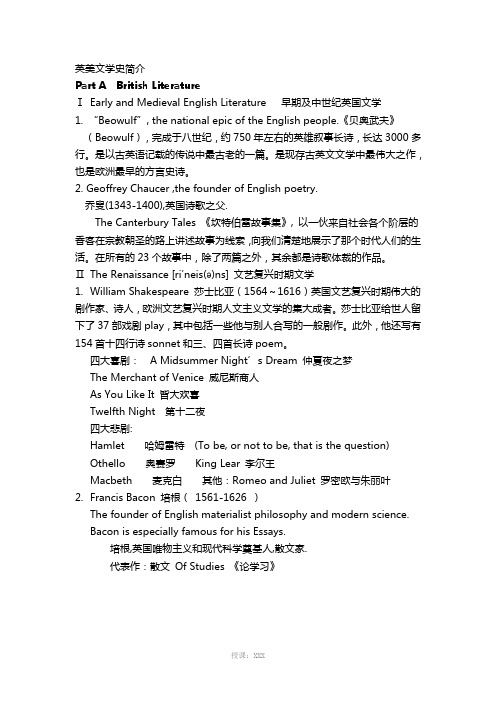
英美文学史简介Part A British LiteratureⅠEarly and Medieval English Literature 早期及中世纪英国文学1. “Beowulf”, the national epic of the English people.《贝奥武夫》(Beowulf),完成于八世纪,约750年左右的英雄叙事长诗,长达3000多行。
是以古英语记载的传说中最古老的一篇。
是现存古英文文学中最伟大之作,也是欧洲最早的方言史诗。
2. Geoffrey Chaucer ,the founder of English poetry.乔叟(1343-1400),英国诗歌之父.The Canterbury Tales 《坎特伯雷故事集》, 以一伙来自社会各个阶层的香客在宗教朝圣的路上讲述故事为线索,向我们清楚地展示了那个时代人们的生活。
在所有的23个故事中,除了两篇之外,其余都是诗歌体裁的作品。
ⅡThe Renaissance [ri′neis(ə)ns] 文艺复兴时期文学1.William Shakespeare 莎士比亚(1564~1616)英国文艺复兴时期伟大的剧作家、诗人,欧洲文艺复兴时期人文主义文学的集大成者。
莎士比亚给世人留下了37部戏剧play,其中包括一些他与别人合写的一般剧作。
此外,他还写有154首十四行诗sonnet和三、四首长诗poem。
四大喜剧: A Midsummer Night’s Dream 仲夏夜之梦The Merchant of Venice 威尼斯商人As You Like It 皆大欢喜Twelfth Night 第十二夜四大悲剧:Hamlet 哈姆雷特(To be, or not to be, that is the question)Othello 奥赛罗King Lear 李尔王Macbeth 麦克白其他:Romeo and Juliet 罗密欧与朱丽叶2.Francis Bacon 培根(1561-1626 )The founder of English materialist philosophy and modern science.Bacon is especially famous for his Essays.培根,英国唯物主义和现代科学奠基人,散文家.代表作:散文Of Studies 《论学习》ⅢThe period of English Bourgeois [buə′ʒwɑ:] Revolution and Restoration 资产阶级革命时期文学1.John Milton 米尔顿Paradise Lost 《失乐园》2. John Bunyan 班扬The Pilgrim’s Progress 《天路历程》ⅣEighteenth Century English Literature 十八世纪英国文学1. Daniel Defoe: 笛福Robinson Crusoe 《鲁滨逊漂流记》2. Jonathan Swift:斯威夫特Gulliver’s Travels 《格列佛游记》3. Henry Fielding 菲尔丁the Founder of the English Realistic Nov 英国现实主义小说奠基人Joseph Andrew 《约瑟夫·安德鲁》4. William Blake 布莱克and Robert Burns彭斯: PoetⅤRomanticism in England 浪漫主义时期文学1. William Wordsworth 华滋华斯the representative poet of the early romanticism. 标志着浪漫主义的开始2. George Gordon Byron 拜伦Don Juan 《唐·璜》3. Percy Bysshe Shelley 雪莱Prometheus Unbound《解放了的普罗米修斯》If winter comes, can spring be far behind? 冬天来了,春天还会远吗?4. John Keats 济慈Ode to a Nightingale 《夜莺颂》5. Jane Austen 简·奥斯汀Pride and Prejudice 《傲慢与偏见》ⅥThe Victorian Age 维多利亚时期文学1. Charles Dickens 狄更斯代表作:Oliver Twist 《雾都孤儿》、A Tale of Two Cities《双城记》、David Copperfield 《大卫·科波菲尔》2. William Makepeace Thackeray 萨克雷代表作:Vanity Fair 《名利场》3. George Eliot 乔治·艾略特4. The Brontë Sisters 勃朗特三姐妹Charlotte Brontë夏洛蒂·勃朗特:Jane Eyre《简·爱》Emily Brontë艾米莉·勃朗特:Wuthering Heights 《呼啸山庄》Annie Brontë安妮·勃朗特5. The Brownings 勃朗宁夫妇Husband: Robert BrowningWife: Elizabeth BrowningSonnets from the Portuguese 《葡语十四行诗集》ⅦTwentieth Century English Literature 20世纪英国文学1. Thomas Hardy 托马斯·哈代Tess of the d’Urbervilles《德伯家的苔丝》2. John Galsworthy 高尔斯华绥3. Oscar Wilde 王尔德Poet,dramatist, novelist and essayist.The Happy Prince and Other Tales 《快乐王子和其他故事》4. George Bernard Shaw 萧伯纳the most important English dramatist5. D. H. Lawrence 劳伦斯Lady Chatterley’s Lover 《查泰来夫人的情人》6. Virginia Woolf 伍尔芙Feminism, the stream of consciousness意识流女权主义与现代主义小说的先驱7. James Joyce 乔伊斯Ulysses《尤里西斯》the stream of consciousness意识流Part B American LiteratureⅠThe Literature During the Colonial American and the American Revolution殖民地时期及独立战争时期的文学Benjamin Franklin 本杰明·富兰克林ⅡAmerican Romanticism and New England Literature 浪漫主义及新英格兰时期文学1. Washington Irving华盛顿•欧文(1783-1859)the first American to achieve an international literary reputation. 是美国文学的奠基人之一。
英国文学简史——18世纪文学
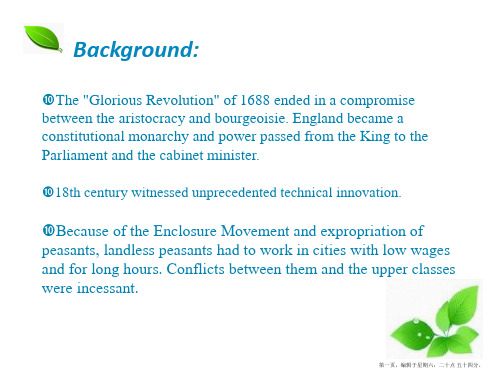
incident recounted by his friend - a fop at the court forcibly cut off a lock of curls of a pretty maid of honour and which caused a quarrel between the families and became the talk of London. Pope satirized the triviality and silliness of the high class with a delicate
edition. The Essay on Man, a philosophical poem, was
published between 1732 and 1734. After 1738, Pope worte little. His major concern at that time was to revise and expand his
Weak and deformed as a child
Self-taught in Latin, French, Italian and Greek poems
Associated with Addison A member of the "Scriblerus
Club"
第八页,编辑于星期六:二十点 五十四分。
Between 27-32, he he worked his translation of the Iliad.
- 1、下载文档前请自行甄别文档内容的完整性,平台不提供额外的编辑、内容补充、找答案等附加服务。
- 2、"仅部分预览"的文档,不可在线预览部分如存在完整性等问题,可反馈申请退款(可完整预览的文档不适用该条件!)。
- 3、如文档侵犯您的权益,请联系客服反馈,我们会尽快为您处理(人工客服工作时间:9:00-18:30)。
Whigs and Tories
❖ The two main parties were so well balanced that a few votes could overturn a cabinet. So the press became a mighty power in England, and any writer with a talent for argument or satire was almost certain to be hired by party leaders.
❖ Envious of the great wealth these empires generated, England, France, and the Netherlands, began to establish colonies and trade networks of their own in the Americas and Asia. A series of wars in the 17th and 18th centuries with the Netherlands and France left England the dominant colonial power in North America and India.
❖ no royal interference of parliament.
❖ Roman Catholics shall not inherit the throne of England.
❖ This led, ultimately, to the establishment of constitutional monarchy. The King George I wasn’t all that interested in English politics and he went to hometown for as long as he could, then Parliament could govern the country without him. So they did.
English literature V-18世纪英国文学
British Empire
❖ During the Age of Discovery in the 15th and 16th centuries, Portugal and Spain pioneered European exploration ss established large overseas empires.
Whigs and Tories
❖ The Glorious Revolution and the Bill of Rights were a good start. As the Bill mainly said:
❖ no royal interference with the law. ❖ no taxation by Royal Prerogative. ❖ no standing army may be maintained during a time of
❖ Whigs(辉格党, 19世纪中叶演变为英国自由党) :determined to safeguard popular liberty.
❖ Tories(托利党,1833年改称保守党):would leave as much authority as possible in the royal hands. many Tories secretly wanted to bring the Stuarts back.
British Empire
❖ At its height, it was the largest empire in history and, for over a century, was the foremost global power. By 1922 the British Empire held sway over about 458 million people, one-fifth of the world‘s population at the time. The empire covered more than 33,700,000 km2, almost a quarter of the Earth's total land area. At the peak of its power, the phrase "the empire on which the sun never sets" was often used to describe the British Empire.
British Empire
Mongol Empire
Eurasia on the eve of the Mongol invasions, c. 1200.
Historical Background
❖ The "Glorious Revolution" of 1688 ended in a compromise between the aristocracy and bourgeoisie. England became a constitutional monarchy and power passed from the King to the Parliament and the cabinet ministers.
Whigs and Tories
❖ No sooner were the people in control of the government than they divided into hostile parties: the liberal Whigs and the conservative Tories.
peace without the consent of parliament. ❖ no royal interference in the freedom of the people to
have arms for their own defense.
the Bill of Rights (1689年权利法令)
